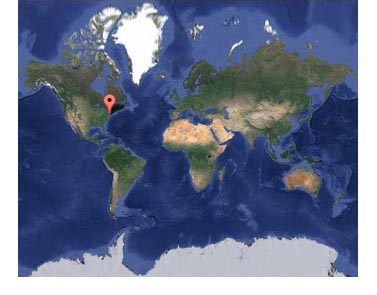Searching localities - things to know
 Type free text into the locality search box to search for any name in the geographical hierarchy, from locality to continent. For instance, entering “amer” will list all localities from the Americas.
Type free text into the locality search box to search for any name in the geographical hierarchy, from locality to continent. For instance, entering “amer” will list all localities from the Americas.
- All localities are geo-referenced and can be plotted on the map, with accuracy level as indicated in the “Accuracy” field. The latter may vary from exactly pinpointing a site, to somewhere near a named place (=region), political divisions, country, or even continent. If exact locality coordinates are known, these were derived either from Google Earth, topographic maps, or GPS-measured field data. If different from WGS84 (World Geodetic System 1984), coordinates were converted with Franson CoordTrans v2.3 software.
- To overcome relational discrepancies between political affiliations and biogeographical mapping, it may be necessary to uncouple the two. For instance, the state of Hawaii politically belongs to the United States of America, but biogeographically forms the Hawaiian subregion within the Pacific region. One solution is to introduce a new geographic hierarchy by adding Hawaii as a primary province to the dummy-country 'United States of America (Hawaii)', and relate this to 'Pacific (Oceania)'. The full geographic hierarchy for a Hawaiian locality therefore reads like 'Violet Lake / Lahaina / Maui Co. / Hawaii / United States of America (Hawaii) / Pacific (Oceania)' and biogeographically relates to the Pacific, rather than to the Nearctic region.
- We recommend not to use Internet Explorer (versions after IE9) for browsing the RWC. There are browser issues with plotting species distributions on the map, and in particular with displaying cluster icons (Marker Cluster) for agglomerated occurrences. All other browsers tested for this feature worked fine (Firefox, Chrome, Safari). As a temporary solution, you can outfox Internet Explorer by hitting F12 and change Browser Mode to IE9, but you would have to repeat this every time you open IE.
- If Google map display is incomplete, refresh your browser.
- If no collecting date is known, the dummy date 01.01.1900 is shown instead under 'Collecting events'.
- For more general hints on how to best use this site see “Help”.
 Type free text into the locality search box to search for any name in the geographical hierarchy, from locality to continent. For instance, entering “amer” will list all localities from the Americas.
Type free text into the locality search box to search for any name in the geographical hierarchy, from locality to continent. For instance, entering “amer” will list all localities from the Americas.
